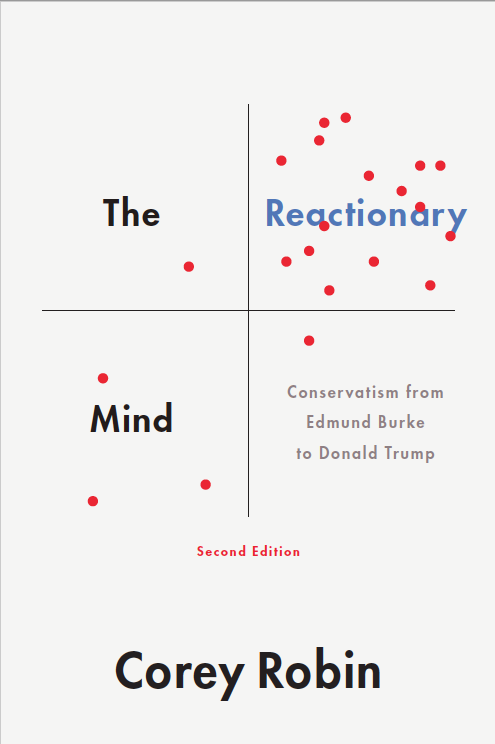Second Edition of The Reactionary Mind now available for order
Sorry for the radio silence. I’ve been hard at work on the manuscript for the second edition of The Reactionary Mind, which I’ve now completed!
While the immediate impetus for the second edition was the election of Trump—so there now will be a 13,000-word monster of a concluding chapter on Trump—the new edition has allowed me to confront some nagging concerns I had about the first edition. As I explain in the preface to the new edition:
Beyond Trump’s election, I had two reasons for writing this new edition of The Reactionary Mind. First, I’ve long felt that the first edition suffered from an inattention to the economic ideas of the right. While some of the essays dealt with those ideas in passing, only one—on Ayn Rand—directly addressed them. Part of this neglect had to do with the genesis of my interest in conservatism and the moment in which many of the essays in this book were first conceived: the George W. Bush years, when neoconservatism was the right’s dominant ideology and war making its dominant activity. That focus on war and violence naturally eclipsed some longstanding conservative themes about the market. In this edition, I have tried to remedy that. I’ve cut four of the chapters dealing with war and peace and have added three new chapters about the right’s economic ideas: one on Burke and his theory of value, one on Nietzsche, Hayek, and the Austrian School of Economics, and one on Trump. The result is a far more comprehensive account of the right’s ideas about war and capitalism.
Second, of all the criticisms this book has generated, the one that hit closest to home was the one I heard from readers rather than reviewers. This criticism was less substantive than structural: the book, readers complained, opened with a strongly argued thesis but then slipped into a seemingly shapeless collection of essays. Over the years, I have taken this criticism to heart. While I had a clear structure in mind for the first edition, that structure was plainly not conveyed to my readers.
For the second edition, I have overhauled the book. It now opens with three theoretical essays that set out the building blocks of the right. I call this “a primer” on reaction. It sets out what the right is reacting against (emancipatory movements of the left) and what it is seeking to protect (what I call “the private life of power”); how it makes its counterrevolutions through a reconfiguration of the old and a borrowing from the new; and the centrality of violence to its means and its ends.
The remainder of the book is organized chronologically and geographically. Part 2 takes us to ground zero of reactionary politics: Europe’s old regimes from the seventeenth to the early twentieth centuries. Situated in three distinct moments of counterrevolutionary time—the English Civil War, the French Revolution, and the proto-socialist interregnum between the Paris Commune and the Bolshevik Revolution—it looks at how Hobbes, Burke, Nietzsche, and Hayek attempted to formulate a politics of privilege in and for a democratic age. The chapters on Burke, Nietzsche, and Hayek also focus on how these thinkers forged an aristocratic politics of war or the market in response to the rise of capitalism. Part 3 brings us to the reactionary apotheosis of US conservatism from the 1950s through today. Here I offer a close reading of five moments of the American reaction: Ayn Rand’s midcentury capitalist utopia; the fusion of racial and gender anxiety in the Republican Party of Barry Goldwater and Richard Nixon; the drums of war in the neoconservative imagination; and the Darwinist visions of Antonin Scalia and Donald Trump.
Here is the new table of contents, which will give you a better sense of the structure of the book:
Preface to the Second Edition
Part 1 Reaction: A Primer
- The Private Life of Power
- On Counterrevolution
- The Soul of Violence
Part 2 Europe’s Old Regimes
- The First Counterrevolutionary
- Burke’s Market Value
- In Nietzsche’s Margins
Part 3 American Vistas
- Metaphysics and Chewing Gum
- The Prince As Pariah
- Remembrance of Empires Past
- Affirmative Action Baby
- A Show About Nothing
Notes
You can pre-order the second edition now. I’m still unclear about the official publication date, but you can still order the book. And did I say you could still order the book now?
It’s got an amazing new cover, which I love:
